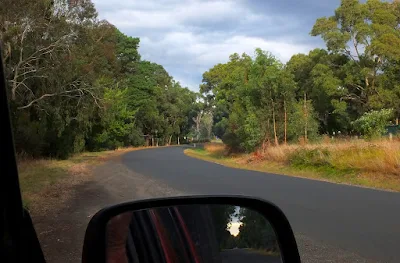Much worldwide research suggests the aesthetic effect of
roadside vegetation provides safety benefits to drivers.
In Europe and the USA, transportation psychologists are
suggesting that safer driver behavior is generated by improving landscape and
streetscape vegetation.
Studies in Canada and other countries show that streetscape
improvements, including the planting of trees, reduced the frequency and
severity of vehicle crashes.
“The presence of trees significantly dropped the cruising
speed of drivers”.
“The addition of curbside trees significantly increased
driver perception of spatial edge”.
 |
| Roadside vegetation can delineate the alignment of a road. |
Could correctly selected and placement of roadside
vegetation do a similar job to the wire rope barriers currently being installed
along our freeways and major link roads – at considerable cost to Victorian
ratepayers, ($120/m? VicRoads)?
Wire rope barriers are designed to stretch and absorb the
force of impact and minimize the chance of rebound back onto the carriageway.
There is some debate that roadside vegetation could achieve the same effect.
 |
| Costly? Effective (in reducing death & serious injury) |
Studies by Monash University Accident Research Centre
conclude that wire rope barriers significantly reduce deaths and serious
injuries in crashes although there is some debate continuing in regard to their
effect on motorcyclists.
 |
| Is the answer a combination of wire barrier and vegetation? |
Wire rope barriers do not reduce the frequency of
accidents. World-wide research suggests that roadside vegetation does.
Further reading:
·
VicRoads Towards Zero – Flexible Wire-rope Safety Barriers Facts.
·
VicRoads Towards Zero – Roadside Management Strategy.
·
Landscape and Urban Planning – Landscape Improvement Impacts on Roadside Safety in Texas, (Abstract – “Environmental psychologists suggest that
appropriately landscaped roadside scenes may have a reducing influence on
travel-related stress or may improve attention…”).
·
Canadian Journal of Transportation – Roadside Aesthetic Appeal, Driver Behavior and Safety, (Abstract – “In contrast with the assumption that
roadside trees distract travellers from the driving task and thus add to
collision risk, several studies actually support the notion that the presence
of trees along the roadside has a calming and restorative effect on the state
of mind of passing drivers and leads them to lower moving speeds.”).
·
US national Library of Medicine - The Effects of Clear Zone Size and Roadside Vegetation on Driver Behavior, (Abstract – “…
studies have shown that
natural landscapes can effectively lower crash rates and cause less frustration
and stress to the driver.”).
·
The
Arboricultural Journal – A Review of the Impact of Roadway Vegetation on Drivers’ Health and Well-being and the Risks Associated with Single-vehicle Crashes,
(Abstract – “Roadside trees can help calm
traffic, define roadways and reduce drivers’ stress.”).
No comments:
Post a Comment